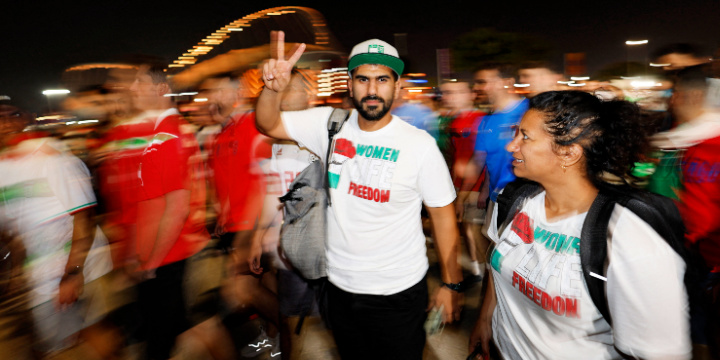Protests Are a Mixed Blessing for World Cup Host Qatar
 by James M. Dorsey
by James M. Dorsey

Iranian soccer fans wearing T-shirts bearing the protest slogan “Women, Life, Freedom” at the 2022 World Cup in Qatar. Photo: Reuters/Hamad I Mohammed
Protest on the soccer pitch has proven to be a mixed blessing for Qatar, exposing double standards in the Gulf state’s position as well as that of its critics.
Qatar embraced protest when it supported Qatari policies, however, protesters and foreign media quickly encountered the limits of Qatari tolerance and notions of freedom of expression when they touched on politically sensitive issues, ranging from support for LGBT rights to solidarity with demonstrators in Iran, who have defied a brutal crackdown by security forces in more than two months of anti-government manifestations.
Photographers were often on the front-line as Qatari authorities stopped them from snapping pictures of security forces preventing fans from wearing clothing to matches, or holding and wearing paraphernalia that signaled support for Iranian protesters or LGBT rights.
The US Soccer Federation joined the fray with Iran ahead of the two nations’ World Cup match when it briefly displayed Iran’s national flag on social media without the emblem of the Islamic Republic, saying the move was in support of protesters in Iran.
Iran accused the federation of removing the name of God from their national flag and said it would complain to FIFA. However, US Soccer later restored the Islamic Republic’s flag on social media.
Meanwhile, Qatari nationals, intending to protest against Western double standards in criticism of the Gulf state, didn’t encounter problems entering the stadium to watch Germany’s group stage match against Spain.
During the game, Qataris displayed pictures of former German national team player Mesut Özil, a German-born descendant of Turkish immigrants, while covering their mouths in protest against German double standards.
In the same vein, prominent Qataris wore pro-Palestinian armbands to the Germany Japan match to counter the pro-LGBT One Love armband sported by German Interior Minister Nancy Faeser during the game.
Qatar’s emir, Sheikh Tamim bin Hamad Al Thani, signaled the Gulf state’s greater assertiveness in countering criticism when he lamented some three weeks before the kickoff of the World Cup that Qatar had been “subjected to an unprecedented campaign,” scrutiny, and scorn “that no host country has faced.”
In an indication that human rights, labor, and LGBT groups may be losing leverage, the emir said that “we initially dealt with the matter in good faith, and even considered some of criticism as positive and useful. … [But] it soon became clear that the campaign tends to continue and expand to include fabrications and double standards that were so ferocious that it has unfortunately prompted many people to question real reasons and motives behind this campaign.”
By allowing Qatar to deflect criticism by calling into question critics’ credibility, activists have enabled the Gulf state to take its counter-offensive to the next level.
A week into the World Cup, Qatar was reviewing, according to the Financial Times, its substantial investments in London after the city’s transport authority suspended advertising from the Gulf state because of the controversies over worker and LGBT rights.
“Countries like … Qatar … view their investments as strategic bribes to mute criticism and resist reforms,” said Radha Stirling, a London-based lawyer who represents expatriates in the Gulf who run into legal difficulties.
Qatar is likely to be the first of numerous rights-focused Middle Eastern battlegrounds, with countries like Saudi Arabia and Egypt hosting or preparing bids to host multiple major sporting events, including Asian Cup competitions, the 2030 World Cup, and the 2036 Summer Olympics.
Dr. James M. Dorsey is an award-winning journalist and scholar, an Adjunct Senior Fellow at Nanyang Technological University’s S. Rajaratnam School of International Studies, and the author of the syndicated column and blog, The Turbulent World of Middle East Soccer.
 Columbia University Shutters Campus as Jews Fear for Safety, Critics Call for President to Resign
Columbia University Shutters Campus as Jews Fear for Safety, Critics Call for President to Resign ‘Hamas, We Love You!’ A List of the Chants, Statements From Columbia University’s ‘Gaza Solidarity Encampment’
‘Hamas, We Love You!’ A List of the Chants, Statements From Columbia University’s ‘Gaza Solidarity Encampment’ ‘Useless Pigs’: Anti-Israel Demonstrations Rage at Yale University, Forcing Police Intervention
‘Useless Pigs’: Anti-Israel Demonstrations Rage at Yale University, Forcing Police Intervention Anti-Israel Protesters Interrupt Chelsea Handler Comedy Show Because of Her Support for Jewish State
Anti-Israel Protesters Interrupt Chelsea Handler Comedy Show Because of Her Support for Jewish State Israeli Hostage Families Make Passover Plea for Return of Missing Loved Ones
Israeli Hostage Families Make Passover Plea for Return of Missing Loved Ones Palestinian Arrested for Murdering Israeli Teen in West Bank Terror Attack
Palestinian Arrested for Murdering Israeli Teen in West Bank Terror Attack A Passover Guide for the Perplexed 2024
A Passover Guide for the Perplexed 2024 Appeasing Iran Will Lead to More Attacks on All of Us
Appeasing Iran Will Lead to More Attacks on All of Us CNN Platforms Biased Journalists in Coverage of Iran, Gaza
CNN Platforms Biased Journalists in Coverage of Iran, Gaza Fatah: Hamas Kills Aid Workers and Steals Food for Itself
Fatah: Hamas Kills Aid Workers and Steals Food for Itself



 Mohamed Hadid Apologizes for Sending Racist, Homophobic Messages to US Rep. Ritchie Torres for Supporting Israel
Mohamed Hadid Apologizes for Sending Racist, Homophobic Messages to US Rep. Ritchie Torres for Supporting Israel Columbia University Shutters Campus as Jews Fear for Safety, Critics Call for President to Resign
Columbia University Shutters Campus as Jews Fear for Safety, Critics Call for President to Resign Voice of America’s Gaza War Recap Omits Vital Context
Voice of America’s Gaza War Recap Omits Vital Context Fatah: Hamas Kills Aid Workers and Steals Food for Itself
Fatah: Hamas Kills Aid Workers and Steals Food for Itself CNN Platforms Biased Journalists in Coverage of Iran, Gaza
CNN Platforms Biased Journalists in Coverage of Iran, Gaza